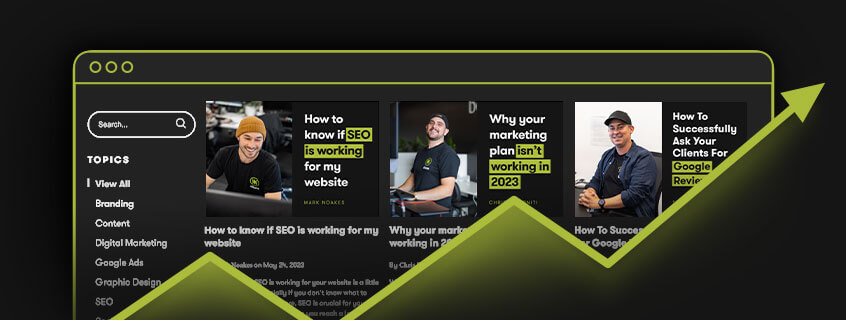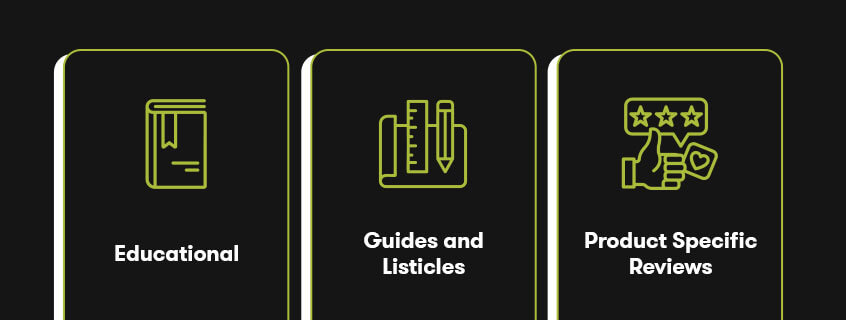

In 2023, where time and resources are scarce and the internet is all about content, blogging can be your secret weapon to boost your business visibility.
Any business in any industry can and should be writing blogs. Millions of people are searching for something on Google everyday. From “how many bananas are too much?” to “check engine light is on, what do I do?” to “how to deal with a breakup?”. The internet is full of new content and people are always searching for a solution to a problem - like you are right now.
You probably heard that you need to improve your online presence, crank up your content and get on the blog-wagon. But you’re probably also wondering why you should invest in it and what it does for your business growth. So let’s explore:

Firstly, let us preface that writing blogs won't immediately improve your return on investment, nor does it have a direct impact on your conversion rate. But it can help to a degree, and here’s 5 ways how:
Let's face it, as a small business owner, time is your most precious resource. You're juggling a million things, and the mere thought of adding "content creation" to your never-ending to-do list seems like a funny joke. Instead of spending countless hours on other marketing strategies that probably aren’t working anymore, blogs can be your efficient sidekick. Once you write a captivating blog post, it can work its magic 24/7, reaching your audience even when you're taking that well-deserved power nap.
Blogs have a long shelf life and continue to attract website traffic and generate leads long after they are published. As you build a collection of blog posts over time, the cumulative effect can be significant. Older posts can still rank in search engines, and they can continue to generate organic traffic and leads, providing ongoing value and contributing to your ROI.
You know your business inside out, and blogs give you the perfect platform to showcase your expertise. Imagine the look on your audiences' faces when they stumble upon your blog, filled with valuable insights and tips that solve their problems. By sharing your knowledge and establishing yourself as an expert, you'll not only win their trust but also turn those readers into loyal customers.
Consistently publishing valuable content helps establish your brand as a thought leader in your industry and enhance your brand awareness and credibility. When people perceive your brand as knowledgeable and trustworthy, they are more likely to engage with your products or services and convert into paying customers, ultimately boosting your ROI.
Ah, the mysterious world of Search Engine Optimisation (SEO). It's like trying to decipher ancient hieroglyphics while blindfolded. Blogs can boost your SEO and make it work for you. With carefully crafted blog posts, you can pepper in relevant keywords and skyrocket your website's ranking on search engines. Just picture your business waving at your competitors from the top of the search results page.
Blogs provide an avenue to target specific keywords and topics related to your business. By creating keyword optimised blogs that align with relevant search queries, you can improve your search engine rankings. Higher visibility in search engine results pages (SERPs) leads to increased organic traffic and potential customers, positively impacting your ROI.
Blogs are not just about giving information; they're about creating an emotional connection with your audience. Great content engages and entertains your readers, which turns them into loyal customers, and loyal customers turn into advocates for your business.
Read how organic content like blogs, can generate demand and convert readers to customers
Blogs offer opportunities to capture leads by including call-to-action (CTA) buttons, building an email list, or downloadable content within your blog posts. By offering valuable content in exchange for contact information, you can convert new visitors into leads into new clients. These leads can then be nurtured, increasing your chances of conversion and better ROI.
In the age of likes, shares, and hashtags, blogs can be your secret weapon to conquer the ever-evolving world of social media. Every blog post you create is a golden opportunity to generate captivating content that can be shared across your social platforms. Think of it as a content conveyor belt that keeps churning out valuable nuggets of information, driving traffic back to your website, and spreading your brand message like wildfire.
The best part is that you can create shorter versions of your blog into multiple social media posts in various formats! You can say goodbye to wondering about what to post next, and instead just pull ideas from your existing pool of blog content!

In the fast-paced world of business, it's vital to stay one step ahead of the competition. Blogs offer you a unique and entertaining way to engage your audience, establish your expertise, boost your SEO, and amplify your social media presence. Depending on the nature of your business, your goals and objectives, and what your target audience's interests are, the types of blogs you can write for your business are endless! So what kind of blogs can you write?
Educational blogs provide knowledge, insights and tips on specific topics. The idea is to share your expertise and answer and address common problems that your business can solve. Educational blogs help build trust, credibility and industry authority.
Guides and listicles are blogs containing useful information that give active step-by-step instructions on how to do something, achieve a goal or offer ideas. They can be super practical and help your audience consider options and solutions to their queries.
Product or service specific blogs help your audience make informed purchasing decisions and position you as an authority in your niche.
Educational, Guides and Listicles, and Product Specific Reviews tackle the abundance of potential customers in the ‘Awareness’ and ‘Interest’ phase of the customer journey map. Download our FREE Customer Journey Map template so you can better understand how content works in each stage of your customers buying journey.

While not writing blogs doesn’t necessarily mean you’ll lose business, it does limit your ability to leverage the organic benefits that blogs can bring.
Without a blog:
So are blogs worth writing for your small business? Absolutely! So how do you start writing blogs?

So you've decided to take the plunge and start writing your own blogs! But where do you begin?
Before you dive into the world of blogging, take a moment to define your goals. What do you want to achieve with your blog? Is it to educate your audience, promote your products or services, establish yourself as an industry expert, or simply entertain? Knowing your goals will help you shape your content and stay focused throughout your blogging journey.
To create compelling content, you must know who you're writing for. Spend some time researching and understanding your target audience. What are their pain points, interests, and preferences? This knowledge will help you tailor your blog posts to their needs, making them more engaging and relatable.
Now it's time to let your creative juices flow! Grab a pen and paper (or a digital device if you prefer) and start brainstorming blog topics. Think about the questions your customers frequently ask, common industry misconceptions, or emerging trends. You can also draw inspiration from your own experiences and unique insights. The key is to come up with topics that might resonate with your audience during their customer journey, and align with your business objectives. Brainstorming topics sets you up towards optimising your content for search (steps 3 to 7).
Don't be afraid to let your personality shine through your writing. Inject humour, tell anecdotes, and share personal stories that resonate with your readers. Remember, people connect with people, not faceless businesses. Your unique voice and style will make your blog posts relatable and keep your audience coming back for more.
While personality is essential, don't forget the core purpose of your blog – to provide value to your readers. Address their pain points, answer their questions, and provide practical solutions. Position yourself as a problem-solver and a trusted advisor. When readers find your blog posts helpful, they'll view your business in a positive light and be more likely to become loyal customers.
Publishing your blog post is just the beginning. Don't forget to promote it! Share it across your social media platforms, send it to your email subscribers, and engage with your audience. Encourage comments, respond to feedback, and keep the conversation going. The more you engage with your readers, the more you'll learn about their needs and preferences, allowing you to create even better content in the future.
Copywriting is a skill in itself. But don’t worry, we’ve got an in-depth 17 step process on do’s and don’ts of copywriting. Spend some time with this blog!

If adding blogs to your content marketing strategy sounds like a good idea, but you’re not entirely sure on how to pull it off, consider reaching out to a digital marketing agency. At Dilate, we can take the weight off your shoulders and make sure your business publishes high-quality and valuable blogs and website content written especially for your target audience. Let’s grow together!
what our clients are saying
create business. better everyday.
Let's Talklearn from the best minds in the business
Bodie provides some insight into Dilate's internal operations. How we approach what we do, and how we strive to be Better Everyday.





